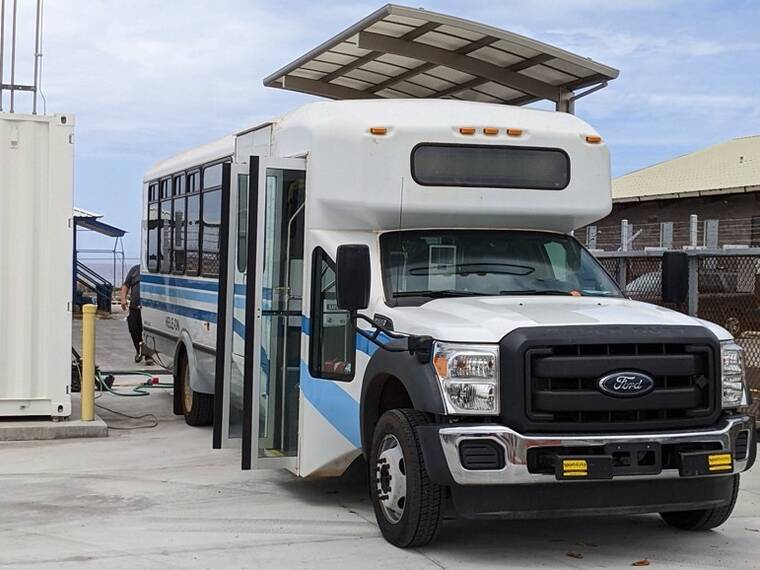Hele-On to operate state’s first hydrogen bus
The Hawaii County Mass Transit Agency, in partnership with the Hawaii Natural Energy Institute and U.S. Hybrid, has taken delivery of its first hydrogen fuel-cell-powered bus, which is intended for operation on Routes 202, 203 and 204 in Kailua-Kona later this spring.
The Hele-On bus is expected to travel approximately 100 miles a day and rotate between the three Kailua-Kona routes, according to a county press release. The vehicle, which the county says is the state’s first hydrogen bus, was delivered March 23 and is being prepared for service.
“We are excited to put our vision into practice in terms of sustainable action on our island,” Mayor Mitch Roth said in a press release. “Shifting our entire county fleet to alternative fuel and electric vehicles is a priority for us, as we continue to push those in our community to consider alternative modes of transportation in a broader effort to curb greenhouse gas emissions and create a more sustainable future for our keiki.”
In 2019, the County Council accepted the 21-passenger 2014 El Dorado Aero Elite as a donation from HNEI. Originally purchased as a gasoline-powered vehicle, it was converted by U.S. Hybrid to hydrogen with a new state-of-the-art 40 kilowatt U.S. Hybrid fuel cell as its proprietary electric drive system.
The County Council is also awaiting delivery of two 19-passenger 2012 El Dorado Aero Elite buses converted for hydrogen fuel-cell power that the Hawaii Volcanoes National Park donated to the county.
The first bus will be operated and maintained by Roberts Hawaii until the base yard in Kailua-Kona is completed (tentatively scheduled for 2025). Then, maintenance will be transitioned to the MTA. Until this transition is completed, the bus will be maintained and fueled at the state-of-the-art hydrogen station built and operated by HNEI at the Natural Energy Laboratory Hawaii Authority (NELHA) and commissioned last year.
The station’s 65-kilogram per day hydrogen production can fuel all three buses. Funding for the station came from various sources, including the Office of Naval Research, the State of Hawaii, and NELHA. The bus was purchased by HNEI using funds from the Energy Systems Development Special Fund, the U.S. Department of Energy, and the Office of Naval Research.
The remaining two 2012 El Dorado Aero Elite buses will be delivered later this year. The upgrades to the two remaining buses are funded from the General Excise Tax.
“Hele-On is excited to be at the cutting-edge and pioneering new fuel technology to reduce our carbon footprint and provide quality service to Hawaii County residents and visitors,” said John Andoh, mass transit administrator. “This hydrogen bus pilot will set the framework for the MTA to consider hydrogen buses that can operate across the island in the future once a hydrogen station in Hilo is constructed.”
Additional program elements include workforce and first responders training on how to operate and maintain a hydrogen bus. HNEI and U.S. Hybrid are providing this training.
In 2017 the four county mayors committed to transitioning the public transit fleets to zero emissions by 2035. As a result, in November 2020, MTA, in partnership with Roberts Hawaii, initiated the operation of a battery-electric bus in Hilo as a first step in MTA’s long-term plans to convert the entire fleet to zero-emission technology. The move to electric and hydrogen-powered vehicles is part of MTA’s plan to convert the Hele-On fleet to 100% zero-emission technology by 2035.
A ribbon-cutting ceremony is planned for May at Kona Commons to coincide with the hydrogen bus being put into formal service. More details will be available in the near future.
“This project, part of HNEI’s hydrogen infrastructure program, supports the introduction of zero-emissions buses for public transportation and will provide valuable information to the public transportation agencies allowing them to make more informed decisions as they transition from their legacy diesel fleets to newer vehicle technology,” Rick Rocheleau, HNEI director, said. “This project is also an important component of HNE’s mandate to help Hawaii reduce its dependence on fossil fuels.”


